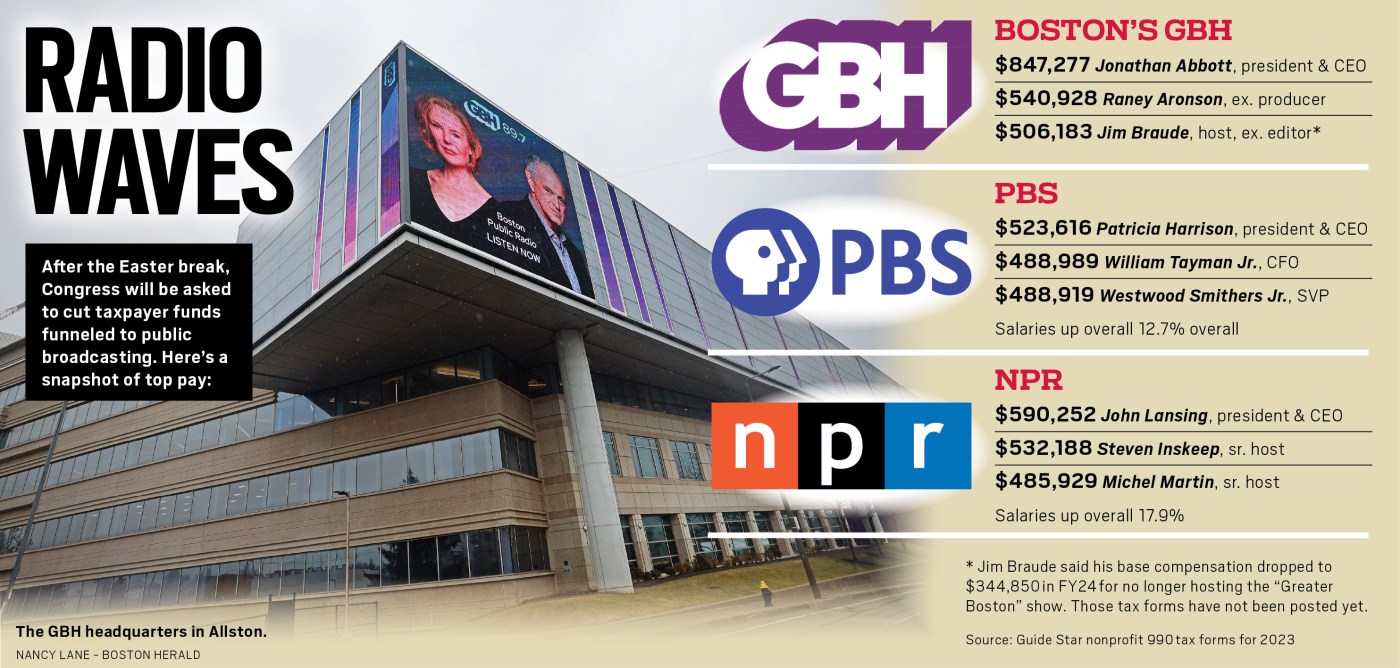
Boston public media outlets brace for Trump funding cuts while some execs earn $300K+
Executives at Boston public media outlets are bracing for potential funding cuts as President Trump looks to recoup taxpayer dollars from the “very biased” news organizations and as some staffers rake in more than $300,000 annually.
As it returns from its Easter break, Congress is set to take up a request from the Trump administration to slash funding from the Corporation for Public Broadcasting, which funds PBS and NPR. Conservatives have targeted these entities for years as they argue the organizations have a liberal bias.
“I don’t even recognize the station anymore,” Kentucky Congressman James Comer said of NPR during a hearing last month. “It’s not news. It feels like it’s propaganda. I feel like it’s disinformation every time I listen to NPR.”
The White House is prepared to send Congress a proposal to cut $1.1 billion from the CPB on Monday, starting a 45-day period during which the administration can legally withhold the funding.
If Congress votes down the plan or does nothing, the administration must release the money back to the intended recipients.
Though the CPB accounts for a small percentage of annual revenue at Boston’s leading public media outlets, 8% at GBH and 3% at WBUR, executives say any funding reduction could cause harm.
GBH President and CEO Susan Goldberg oversees the nation’s largest content producer for PBS, connecting the Bay State from “Oak Bluffs to the Berkshires with our local news programming.” The network also produces national shows such as “Antiques Roadshow,” “American Experience,” and “Arthur.”
Membership fees drive a bulk of the network’s revenue, accounting for $31.7 million compared to $2.8 million in government contributions in Fiscal Year 2023, according to GBH’s latest available tax filings.
“Although we have a broad base of support, all of our trusted and award-winning offerings for local, national, and international audiences could be impacted by the loss of federal funding,” Goldberg said in a statement shared with the Herald. “While the conversation continues in Washington, we’re preparing for what we can, and staying focused on doing the work that makes us a vital community resource.”
WBUR CEO Margaret Low, in a letter to listeners last month, highlighted how federal funding supports “stations across the country that air our two national shows, Here & Now and On Point,” and how the “syndication dollars help fuel” the station.
“As journalists, we will cover what unfolds without fear or favor — no matter what is happening to us,” Low wrote. “Our reporting must be fact-based and impartial. We are not the resistance.”
GBH and WBUR are dealing with “financial headwinds,” as the nonprofit organizations have laid off dozens of employees and cut programming over the past few years.
Months after it warned of cost-cutting moves, GBH cut 31 workers from 13 departments – about 4% of the station’s workforce – last May as it confronted a $7 million budget gap. Production of “Greater Boston,” “Talking Politics,” and “Basic Black” was also suspended.
“Costs associated with providing trusted local and national programs are increasing, due in part to overall economic inflation,” GBH’s annual report stated in 2023. “Support for GBH continues to be strong but has not kept pace with expense growth.”
According to GBH’s tax filing for Fiscal Year 2023, 13 executives made at least $300,000 in total earnings. Jonathan Abbott, the previous president and CEO, took in $847,277, executive producer Raney Aronson $540,928, and Boston Public Radio host Jim Braude $506,183.
Braude has said his base compensation dropped to $344,850 in FY24 for no longer hosting the “Greater Boston” show. Those tax forms have not been posted yet.
Officials in the filing highlighted how its commitment to “diversity, equity, inclusion and accessibility” is the “foundation for everything we do.” The Trump administration has warned of funding cuts to organizations that champion DEI initiatives.
“That mission continually drives us to develop robust programs and resources for the public,” GBH officials wrote in the filing. “We’re a trusted news organization that is driven by facts rather than factions.”
WBUR, Boston’s NPR station, laid off seven employees, while 24 others took buyouts, last year as its on-air sponsorship income had plummeted by $7 million in recent years. It also canceled its midday show Radio Boston.
Officials did not respond to a Herald request for comment. Its latest tax filing was not immediately available.
Paul Diego Craney, spokesman for watchdog Massachusetts Fiscal Alliance, told the Herald that the proposed cuts to public media outlets reflect how priorities are being reassessed under the Trump administration.
“Taxpayers are being prioritized,” Craney said in a statement. “While some local media organizations are potentially in the crosshairs, to ensure their (long-term) success, they need to adopt business models that are completely self-sufficient.”
U.S. Sen. Kristen Gillibrand, D-New York, is fundraising off the issue as she seeks reelection in November. In a campaign newsletter last week, Gillibrand called on her supporters to “show support for public broadcasting.”
“Congress hasn’t acted yet,” Gillibrand stated, “so we still have time to gather public support to stop this direct attack against free and public media.”
Herald wire services contributed to this report


